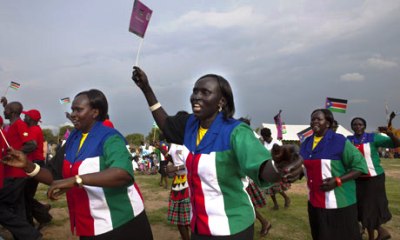Women demand inclusion in South Sudan’s peace process
October 28, 2019 (JUBA) – Women in South Sudan have urged the country’s leaders to ensure the 35% affirmative action allocated for them is represented in new transitional government of national unity.

About 60 participants, who included local authorities, faith-based groups, civil society and various political parties attended the forum.
Developing a road map for ensuring that the provision for 35% representation of women in the unified transitional government, due to be formed on November 12 is real was key during the discussions.
Ann Itto, a member of the East African assembly representing South Sudan argued that strong action needed to be taken by women themselves if they wanted the 35% affirmative action to be realized.
She encouraged women to join political parties and pressure groups as well as the security sector to challenge the patriarchal society that dominates South Sudan.
Itto, a senior member of the ruling party (SPLM) reminded the group of their power and influence, particularly during elections and referendums, given women make up the majority of the population.
“A party is where they cook the soup and it is served to the people. They can fight for your rights, and there are many things that you can achieve through being in the party,” said the official.
“You need to fight for the policies including electoral laws that protect the interest of women when you become part of these organizations,” she added.
The East African legislative assembly MP said it was vital that women took a unified approach to the peace process, including issues like securing accountability for crimes committed during the conflict.
“You must walk back to the women at grassroots level and move forward with them to translate the 35 percent into reality,” said Itto.
“Also, for us to bring peace to ourselves, we need to respect the transitional justice process so we can tackle ruining cases like rape,” she added.
On her part, however, the Minister of Gender, Child and Social Welfare, Rose Paulino Lisok urged the participants to submit recommendations from the forum to the government so that an action plan could be developed and implemented, including translating the 2018 peace agreement into the various languages.
Meanwhile UNMISS Gender Affairs Unit representative, Gladys Jambi, said the mission was working with authorities to promote gender provisions within the revitalized peace agreement and to identify any gaps that may hinder women’s full participation in governance.
“UNMISS will continue to lead peace building engagement across the country, including promoting gender inclusivity, with the support of civil society organizations, faith-based groups and government officials,” she said.
(ST)
